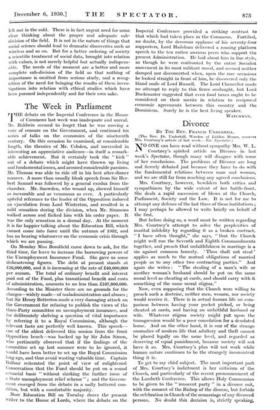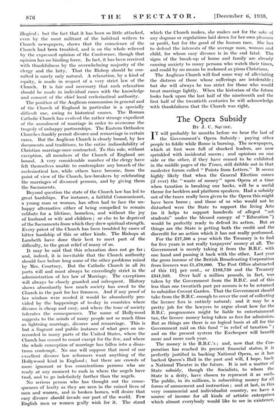Divorce
By THE REV. FRANCIS UNDERHILL.
[The Rev. Fr. Underhill, Warden of Liddon House, answers Mrs. Courtney's article of last wook.—ED. Spectator.] NO ONE can have read without sympathy Mrs. W. L. Courtney's spirited article on Divorce in last week's Spectator, though many will disagree with sonic of her conclusions. The problems of Divorce are long and fiercely debated just because they have to do with the fundamental relations between man and woman, and we are still far from reaching any agreed conclusions.
Mrs. Courtney, hoWever, bewilders both critics and sympathizers by the wide extent of her battle-front. She deals a rapid succession of blows at the Church, Parliament, Society and the Law. It is not for me to attempt any defence of the last three of these institutions ; I may perhaps be allowed to write briefly on behalf of the first.
But before doing so, a word must be written regarding Mrs. Courtney's attempt to solve the perplexities of marital infidelity by regarding it as a broken contract. " I have often thought," she says, " that the Church might well run the Seventh and Eighth Commandments together, and preach that unfaithfulness in marriage is a sin against common honesty. ' Thou shalt not steal ' applies as much to the mutual obligations of married people as to any other two contracting parties." And again she writes : " The stealing of a man's wife or another woman's husband should be put on the same Moral level as cheating at cards, and should carry with it something of the same moral stigma."
Now, even supposing that the Church were willing to preach such a doctrine, neither men, women, nor society would receive it. There is in actual human life no com- parison between having your pocket picked, or being cheated at cards, and having an unfaithful husband or wife. Whatever stigma society might put upon the transgression would be a poor consolation for a desolated home. And on the other hand, it is one of the strange anomalies of modern life that adultery and theft cannot be placed legally on the same level, and regarded as deserving of equal punishment, because society will not have it so. Mrs. Courtney's plan will not work while human nature continues to be the strangely inconsistent thing it is.
To get to my chief subject. The most important part of Mrs. Courtney's indictment is her criticism of the Church, and particularly of the recent pronouncement of the Lambeth Conference. This allows Holy Communion to be given to the " innocent party " in a divorce suit, with the consent of the Bishop of the diocese, but forbids the celebration in Church of the remarriage of any divorced persons, No doubt this decision is, strictly speaking, illogical ; but the fact that it has been so little attacked, even by the most militant of the habitual writers to Church newspapers, shows that the conscience of the Church had been troubled, and is on the whole relieved by the expressed opinion of the Conference, though that opinion has no binding force. In fact, it has been received with thankfulness by the overwhelming majority of the clergy and the laity. That the Bishop should be con- sulted is surely only natural. A relaxation, by a kind of equity, is made in respect of a very strict law of the Church. It is fair and necessary that such relaxation should be made in individual cases with the knowledge and consent of the chief local ecclesiastical authority.
The position of the Anglican communion in general and of the Church of England in particular is a specially difficult one, owing to historical causes. The Roman Catholic Church has evolved the rather strange expedient of the annulment of marriage in order to overcome the tragedy of unhappy partnerships. The Eastern Orthodox Churches frankly permit divorce and remarriage in certain eases. But the Anglican Church is closely bound, by her documents and traditions, to the entire indissolubility of Christian marriage once contracted. To this rule, without exception, all members of the Church of England are bound. A very considerable number of the clergy have felt themselves unable to contemplate any breach of the ecclesiastical law, while others have become, from the point of view of the Church, law-breakers by celebrating the marriages of divorced persons, and by giving them the Sacraments.
Beyond question the state of the Church law has led to great hardships. For instance, a faithful Communicant, a young man or woman, has often had to face the un- happy alternative either of being compelled to remain celibate for a lifetime, homeless, and without the joy of husband or wife and children ; or else to be deprived of the Sacraments from which they drew spiritual strength. Every priest of the Church has been troubled by cases of bitter hardship of this or other kinds. The Bishops at Lambeth have done their best to meet part of the difficulty, to the great relief of many of us.
It may be said that this relaxation does not go far ; and, indeed, it is inevitable that the Church authority should face before long some of the other problems raised by Mrs. Courtney. But the Catholic Church in all its parts will and must always be exceedingly strict in the administration of her law of Marriage. The exceptions will always be closely guarded and infrequent. History shows abundantly how much society has owed to the Church in the past for her firmness. And if any proof of her wisdom were needed it would be abundantly pro- vided by the happenings of to-day in countries where divorce is cheap and easy, and where the tone of society tolerates the consequences. The name of Hollywood suggests to the minds of many people not so much films as lightning marriage, divorce and remarriage. This is but a flagrant and public instance of what goes on un- recorded in many parts of the United States, where the Church has ceased to count except for the few, and where the whole conception of marriage has fallen into a disas- trous contempt. No one will suppose that most of our excellent divorce law reformers want anything of the Hollywood kind in England ; but there are crowds of more ignorant or less conscientious persons who are ready at any moment to rush in where the angels have trod, and to go indefinitely further than the angels.
No serious person who has thought out the conse- quences of laxity as they are seen in the ruined lives of men and women, and in broken homes, will desire that easy divorce should invade our part of the world. Few English men or women wally wish for it. The stand which the Church makes, she makes not for the sake of any dogmas or regulations laid down for her own pleasure or profit, but for the good of the human race. She has to defend the interests of the average man, woman and child, for whom easy divorce is in the end fatal. The signs of the break-up of home and family are already causing anxiety to many persons who watch their times, and could by no means be reckoned as pious Christians.
The Anglican Church will find some way of alleviating the distress of those whose sufferings are intolerable ; but she will always be too strict for those who would treat marriage lightly. When the historian of the future looks back upon the last half of the nineteenth and the first half of the twentieth centuries he will acknowledge with thankfulness that the Church was right.



























































 Previous page
Previous page